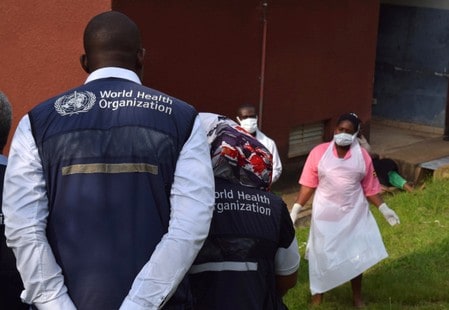By Stephanie Nebehay
GENEVA (Reuters) – There has been no known person-to-person spread of Ebola in Uganda despite the deaths of two people there who arrived with the disease from Congo, the top World Health Organization (WHO) expert told Reuters on Thursday.
Dr. Mike Ryan, head of WHO’s emergencies program, said that he expected Uganda to approve the use of experimental therapeutic drug treatments, to be shipped “in coming days”. Monitoring and vaccination had been stepped up, but there had been “no panic reaction” so far to the cases there.
A young boy and his grandmother died of the disease in Uganda this week after arriving from Democratic Republic of Congo. One other person has been confirmed as having Ebola and three people are in isolation in Uganda but have not shown symptoms, Ryan said.
The Ugandan health minister said earlier on Thursday that authorities had sent relatives of the two people who died back to Congo, including a 3-year-old boy confirmed to be suffering from the disease.
Ryan said that move had been taken to ensure that the boy could receive treatment which was available in Congo but not yet ready in Uganda: “The protocols for using those therapeutics are currently under final approval within Uganda itself and we should have the drugs there within the coming days,” he said.
Eastern Congo is facing the second worst Ebola outbreak in history, known to have infected 2,071 people in North Kivu and Ituri provinces, including 1,396 who have died.
Health workers in Uganda and people potentially exposed to the virus – including 27 known contacts of the patients – will be vaccinated starting on Friday, Ryan said. WHO sent 3,500 doses of a Merck experimental vaccine to Uganda this week, following 4,700 initial doses.
“The virus spreads along social networks, family networks. And identifying those social networks and ensuring that both contacts and contacts of those contacts are vaccinated is a highly effective strategy,” Ryan said.
The WHO’s emergency committee is scheduled to meet on Friday to decide whether the Ebola outbreak constitutes an international emergency, which could lead it to make recommendations on travel or trade.
“Of note is the fact that while the disease has crossed the border, there has been no documented local transmission. The exposure of these individuals occurred in Congo,” Ryan said.
“We haven’t seen a panic reaction in the community” in Uganda, he added. “So the system, the preparedness system, thus far has worked extremely well, and it is a testament to the work that has been completed.”
The spread of the disease in Congo has been worsened by insecurity, including attacks on health workers. Since January, WHO has documented 174 attacks there that have caused 5 deaths and 51 injuries among health care workers and patients.
(Reporting by Stephanie Nebehay)


